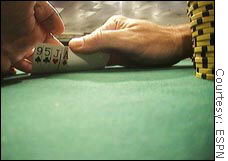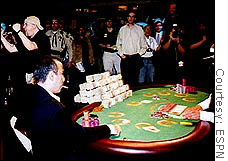
NEW YORK (CNN/Money) - It's a sport where the major stars often aren't around for the biggest games. Its games are shown weeks, if not months, after they're played. And the viewers exert almost as much energy as the competitors, which is to say, not much at all.
 |
|
| Networks are rushing to get in on the televised poker boom. |
But the one sure bet in television sports today is that poker is probably the hottest sport going. In fact, poker's rating success ensures we'll see far more of it the coming months and years.
When ESPN started its broadcasts of the World Series of Poker this week, for example, it drew a 1.8 and 1.9 rating for the first two hourly shows, shown back to back this past Tuesday.
That's about twice the typical SportsCenter rating, and it's better than the average rating ESPN gets for regular-season games of such "major" sports as college football, Major League Baseball, the National Basketball Association and the Professional Golfer's Association.
ESPN pays hundreds of millions of dollars for the rights to those lower-rated sports. So the attraction of poker is obvious.
"I was an advocate of poker on television, and I was stunned by how much it grew," said Norman Chad, ESPN's poker analyst.
ESPN won't say how much it had paid to broadcast the World Series, but it's not much. "Our deal here is much more of a production cost for us than it a rights fee deal," said Mike Antinoro, the show's executive producer, Mike Antinoro.
Another lure for ESPN is that it can show the same poker events time and time again, and continue to rake in viewers and advertising dollars. A 22-hour marathon of the 2003 World Series of Poker, rebroadcast just last month, drew an average 0.4 rating.
I doubt the 2003 baseball World Series would have done nearly that well if it had been rebroadcast a year after the fact.
 |
|
| Chris Moneymaker wins the 2003 World Series of Poker. |
The World Poker Tour, which by far is the best rated show on the Travel Channel, received a relatively modest rights fee of $10.8 million for its third season, according to the prospectus for WPT Enterprises, its parent that is planning an initial public offering later this year.
The Travel Channel got an average 1.2 rating for the second season of the show, or about triple the network's average prime time rating.
Steven Lipscomb, creator of World Poker Tour, first began thinking of poker on television after making a documentary about the World Series of Poker in 1998.
"I went out and pitched to every network you can imagine, and none of them had any interest," he said. Now, everyone is rushing to throw their broadcast chips into the pot.
Fox Sports Net is looking to broadcast the first live poker tournament Wednesday, July 14, and plans an all-star game in August.
NBC Universal's Bravo cable network has its own celebrity poker now in its second season, and NBC itself used the Travel Channel's World Poker Tour as counter-programming to the most recent Super Bowl, pulling down a respectable 2.3 rating for that night.
Not everyone can be a winner
Of course, there are risks for all those betting on the continued growth of the sport on television.
"Most people watching want to get tips on how to be better poker players," said George Greenberg, executive vice president at Fox Sports Net.
| SportsBiz
|

|
| Click here for SI.com sports coverage
|
|
|
|
If that's true, there's probably a limit on how big an audience it will be able to reach. Even with the growth if Internet gambling and legalized casinos popping up around the country, there are only so many gamblers out there. The sports that build the large, sustainable audiences are the ones which draw participants and non-participants alike, like football and Nascar.
Another risk is that the market will soon become flooded with poker on television. Even the industry's poker advocates foresee a time -- perhaps soon -- when there is just too much.
Frankly, as ironic as it sounds, the inability of viewers to bet on the games they're watching is an issue, too. (Football and basketball would have a fraction of their current audiences if there weren't viewers out there with money on the games.)
Since poker tournaments take longer to play than can be watched easily, live events will stay the exception not the rule. And taped events take away the ability to bet on the games, unless you're lucky enough to find a particularly dumb bettor.
For right now, though, the networks still have plenty of chips in front of them. The fact that someone will eventually lose their shirt won't deter each of them from believing they'll be the big winner. That's poker, after all.

|

